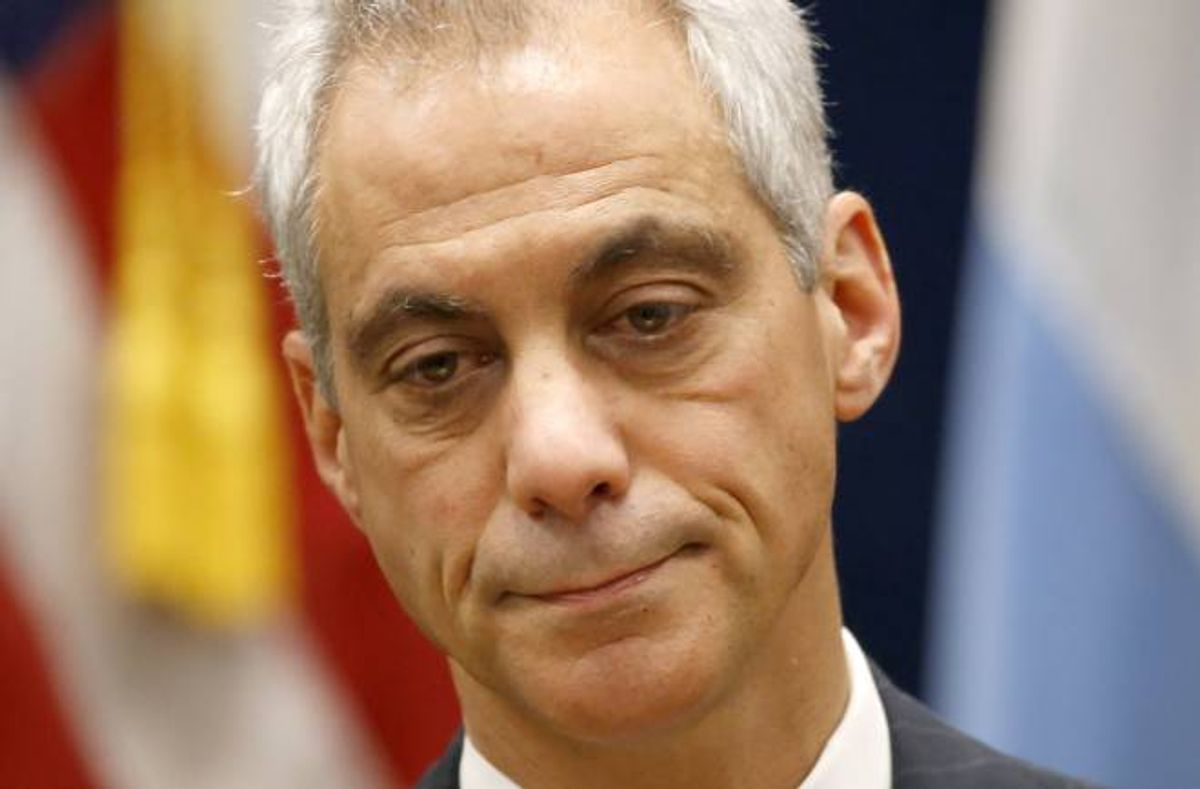Calls for the resignation of Chicago Mayor Rahm Emanuel have swelled after police in the city "accidentally struck and tragically killed" a mother of five over the weekend.
The police were responding to a domestic disturbance at an apartment when they opened fire on Saturday morning.
Quintonio LeGrier, 19, was also killed in the shooting, along with the 55-year-old mother Bettie Jones.
Jones was an activist involved in encouraging peace in the community. LeGrier's father said the young man was a "whiz kid" who was studying electrical engineering technology at Northern Illinois University.
Family and activists amounting to roughly 100 people held a vigil for the victims on Sunday.
Those attending stressed that police should use nonlethal methods of policing like stun guns. One activist held a sign that said "stop killing us," while others chanted "This is not an accident!"
LeGrier's mother, Janet Cooksey, said at a news conference on Sunday, "I used to watch the news daily and I would grieve for other mothers, other family members, and now today I'm grieving myself."
At the news conference, Cooksey was wearing a shirt emblazoned with Mayor Emanuel's face and the words "Rahm Failed Us."
The AP reported that one Jones' friends at the news conference lamented that Chicago police "shoot first and ask questions later."
"It's ridiculous," she added.
The Chicago Police Department says the shootings are being investigated. The lawyer for the Jones family said police confiscated the hard drive of a home-security camera from across the street that captured the shootings.
Emanuel said in a statement, "Anytime an officer uses force the public deserves answers, and regardless of the circumstances, we all grieve anytime there is a loss of life in our city."
The killings come at a time while a federal civil rights investigation is being conducted into the Chicago Police Department's practices. The investigation began in November, when, due to FOIA requests from journalists, police dash cam video from Oct. 20 2014 was released showing white Chicago police officer Jason Van Dyke shooting black 17-year-old Laquan McDonald 16 times.
Police had previously said they shot McDonald in self-defense, claiming he had threatened them. The footage, nevertheless, shows that the department lied about the killing, and that young man was in fact feet away from them, walking away at the time he was killed. When the video was made public, activists accused the local government of orchestrating a citywide cover up.
At the vigil, the Chicago-based Reverend Marshall Hatch remarked, "Something is seriously wrong. How, in the middle of all this scrutiny, [can you] have a trigger-happy policeman?"
For years, activists have called for the resignation of Emanuel, who has overseen a police department that is rife with controversy and often accused of overly aggressive policies. The killings have reinvigorated calls for his ouster.
The Rev. Al Sharpton has joined in the calls for Emanuel's resignation. "You talk about a crisis on steroids," he said Monday on MSNBC's "Morning Joe." "You are in the middle of a recall vote, they are circulating petitions in Chicago to recall you, the state legislature is going to have to deal with it and you don’t even come back? This is the height of either insensitivity or lack of intelligence or arrogance, or a reasonable combination of all three."
The Chicago Police Department has a long history of brutality, and has been embroiled in numerous scandals over the past decades.
After years of organized protests and action, activists pressured the Chicago government in earlier this year to create a $5.5 million reparations fund for victims of police brutality.
Responding to the pressure from civil rights activists, Emanuel admitted that the practices of former Chicago Police Commander Jon Burge, who served from the 1970s to the '90s and was notorious for racist policing and extreme abuse of black residents, were a "stain that cannot be removed from our city's history."
Burge and his detectives systemically tortured suspects. They resorted to electric shocks, beatings, suffocation, and even Russian roulette to force suspects to confess to crimes they didn't commit.
Burge, who had served in the military before becoming a Chicago police commander, governed much more like a military power than a civilian one. His department's use of torture to procure confessions led former Illinois Gov. George Ryan in 2000 to declare a moratorium on the death penalty.
In January 2011, Burge was sentenced to four-and-a-half years in federal prison. He was released early, however, in October 2014.
The reparations fund created this year came after the city government had already paid more than $100 million in legal settlements to victims of police brutality.
Activists from the Black Lives Matter civil rights movement — which was launched in Ferguson, Missouri in 2014 after the police killing of unarmed black teen Michael Brown — see the police killings of Jones, LeGrier, and McDonald, and the subsequent government reactions to these shootings, as symptomatic of a larger pattern of racially charged police brutality and systemic racism.




Shares